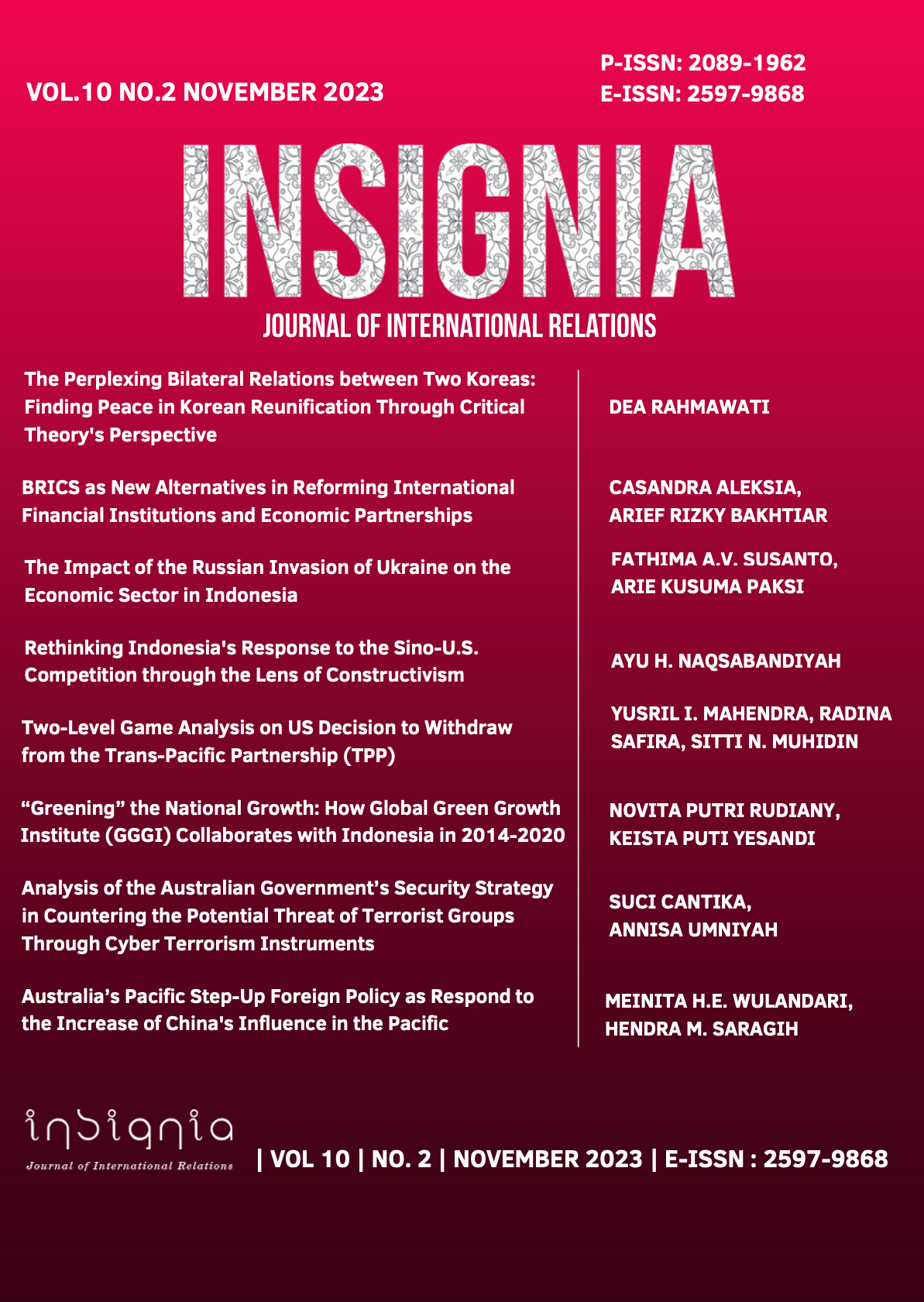The Perplexing Bilateral Relations between Two Koreas: Finding Peace in Korean Reunification Through Critical Theory's Perspective
Abstract
Despite being formerly homogeneous in terms of history, culture, language, and nation, the separation of the Korean people has led to significant contrasts in political, economic, and cultural aspects between South Korea and North Korea. Conflict resulting from these differences eventually leads to war. However, since World War II, the two Koreas have been seeking reunification in three different ways: "reunification through war," "reunification through revolution," and "peaceful reunification." These Three Concepts of Korean Reunification was driven by the distortion of the term peace. This research employed a case study method to analyze a specific historical event to gain a comprehensive understanding of peace related to the three different concepts of Korean Reunification. Peace is essential for the realization of the reunification of separated nations. The Korean reunification program is affected by the research finding that given their common ethnicity, culture, familial ties, economic complementarity, international diplomacy, humanitarian concerns, and nuclear disarmament, the reunification process between North and South Korea has the possibility for peaceful reconciliation. However, a distorted understanding of peace has created challenges in Korea Reunificationwhere peace was built on mutual distrust and fear, making achieving a positive and sustainable peace exceedingly difficult, and meaningful reunification has yet to occur.
Keywords: bilateral, Critical Theory, East Asia, Korean Reunification, peace concepts
References
Bennett, A. (2004). “Case Study Methods: Design, Use, and Comparative Advantages.” In Detlef Sprinz and Yael Wolinsky-Nahmias, eds., Models, Numbers, and Cases: Methods for Studying International Relations (pp. 20-38). Michigan: University of Michigan Press.
Bermudez, J. S. (2017). Overview of North Korea’s NBC Infrastructure. USA: US-Korea Institute at Johns Hopkins SAIS.
Fitrah, E. & Ramadhani, Z. A. (2018). Analisis Pendekatan Trust Politic Korea Selatan dalam Penyelesaian Hambatan Reunifikasi di Semenanjung Korea. Insignia Journal of International Relations, (5)1, 85–95.
Ha, Y. (2021, 21 May). “The History of Conceptual Bifurication of ‘Peace’ in the Two Koreas.” GLOBAL NK, East Asia Institute. Accessed from https://globalnk.org/report/view?cd=REPOOOOO4.
Hadiwinata, B. S. (2017). Studi dan Teori Hubungan Internasional: Arus Utama, Alternatif, dan Reflektivitis. Jakarta: Yayasan Pustaka Obor Indonesia.
Hanssen, U. & Woo, E. H. (2020). Korean Reunification Can the Dream Be Realized? Stockholm: The Swedish Institute of International Affair.
Dotto, C., Lendon, B. & Yeung, J. (2022, 26 December). “North Korea’s record year of missile testing is putting the world on edge.” CNN. Accessed from https://edition.cnn.com/2022/12/26/asia/north-korea-missile-testing-year-end-intl-hnk/index.html.
Lerner, M. (2010, December). “Mostly Propaganda in Nature:” Kim Il Sung, the Juche Ideology, and the Second Korean War. Washington: Woodrow Wilson International Center for Scholars.
Martin, F. E. (2005). Critical Analaysis of The Concept of Peace in International Relation. Peace Research, 37(2), 44-59.
Richmond, O. P. (2007). Critical Research Agenda for Peace: The Missing Link in The Study of International Relation. Alternatives, 32(2), 247-274.
Satria, A. V., Puspita, R. H., & Kristiono, M. J. (2018). Pengaruh Persepsi Konstruksi Sosial Kawasan Asia Timur Terhadap Kebijakan Nuklir Korea Utara: Analisis Terhadap Perubahan Sikap Korea Utara Menuju Deklarasi Panmunjom. Insignia Journal of International Relations, 5(2), 109-126.
Shin, M. (2021a, 12 August). “North Korea Issues Warning Over South Korea-US Joint Military Exercises.” The Diplomat. Accessed from https://thediplomat.com/2021/08/north-korea-issues-warning-over-south-korea-us-joint-military-exercises/.
Shin, H. (2021b, 15 August). “S. Korea, U.S. to begin joint military drills despite N.Korea rebuke.” Reuters. Accessed from https://www.reuters.com/world/skorea-us-begin-joint-military-drills-monday-yonhap-2021-08-15/.
Yong, K. H. (2016, 29 January). “S. Korea Eyes US Missile Defense System as North Continues Tests.” VOA News. Accessed from https://www.voanews.com/a/south-korea-eyes-united-states-missile-defense-system/3169449.html.

This work is licensed under a Creative Commons Attribution-NonCommercial-ShareAlike 4.0 International License.
1. The author retains copyright and grants the journal the right of first publication with the work simultaneously licensed under a Creative Commons attribution license that allows others to share the work within an acknowledgment of the work’s authorship and initial publication of this journal.
3. Authors are permitted and encouraged to post their work online (e.g., in institutional repositories or on their websites) before and during submission, as it can lead to productive exchanges and earlier and more extraordinary citations of published works.


.png)


